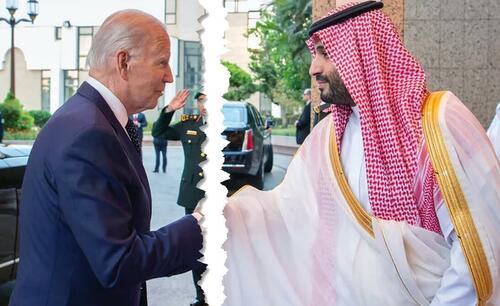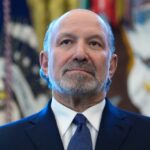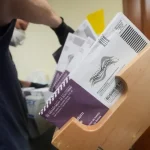
Authored by James Durso via OilPrice.com,
-
Washington responded angrily to OPEC+’s decision to cut output.
-
U.S. legislators have suggested the introduction of a bill called NOPEC in order to reduce OPEC’s power.
-
NOPEC could send oil prices higher and end the dominance of the petrodollar.
“Nobody f*cks with a Biden,” said the U.S. president, and the oil ministers of the member countries of the Organization of the Petroleum Exporting Countries (OPEC+) replied, “Hold my beer.” OPEC+ then proceeded to approve production cuts of 2 million barrels per day, despite a full court press by the administration in the weeks leading up to the decision, and raised the price of oil for the U.S., lowered it for Europe, and left it unchanged for Asia. According to National Security Advisor Jake Sullivan, “the President is disappointed by the shortsighted decision by OPEC+ to cut production quotas” and “the Biden Administration will also consult with Congress on additional tools and authorities to reduce OPEC+’s control over energy prices,” neglecting to mention that Biden administration decisions to cancel the Keystone XL pipeline and to stop issuing new oil and gas leases on public lands gave OPEC+ the upper hand.
Apparently, a fist bump only gets you so far.
There followed a lot of “how dare they!” by the great and good, but OPEC+ was having none of it. The day before the announcement, the Saudi energy minister dressed down a Reuters reporter for shoddy work by his colleague who claimed that Russia and Saudi Arabia (the Kingdom) conspired to price oil at $100 per barrel, and later explained OPEC+ was being proactive as the West is attacking inflation with higher interest rates which, in turn, may cause a recession and drive down oil demand (and price). Amin Nasser, Saudi Aramco’s chief executive officer, explained that the leading cause of today’s energy crisis is years of underinvestment in oil and gas production and that the situation will be worse when the global economy rebounds from the current slowdown.
The OPEC+ decision was no doubt based on market fundamentals but part was likely fallout from Biden calling Saudi Arabia and its crown prince, Mohammed bin Salman (MbS), a “pariah” for the killing of activist and Muslim Brotherhood sympathizer Jamal Khashoggi. It probably sounded great on the campaign trail but there is no avoiding the crown prince in America’s dealings with the Kingdom. OPEC+ was said to have “sided with the Russians” – perfect fodder for cable news shows - but it was just looking after its own interest. Also overlooked was the fact that the Saudis worked hard to get Russia, a major oil producer, into OPEC+ to ensure its moves would be in harmony with the organization - which it finally did in 2016 - and to ensure U.S. firms did not dominate the oil market – a pretty reasonable move, actually, for an economic competitor.
American critics demanded the U.S. cancel maintenance contracts for U.S.-supplied military equipment and, days later, three Democrat congressmen introduced a bill to remove U.S. troops and air defense systems from the United Arab Emirates (UAE) and the Kingdom, and two other Democrat legislators introduced a bill that would halt all arms sales to Riyadh. Congress may resurrect the No Oil Producing and Exporting Cartels Act (NOPEC), which would remove the sovereign immunity for OPEC+ as a group and for its individual member states in U.S. courts, leaving them open to prosecution under U.S. anti-trust legislation, or referral for investigation by the World Trade Organization.
Of course, NOPEC could also send oil prices higher and end the dominance of the petrodollar, especially if Saudi Arabia prices oil sales to China, its biggest customer, in Yuan, and de-pegs oil from the dollar.
What the Biden administration and its confederates are not mentioning (and are hoping voters forget) is that American decisions put America in this spot.
In addition to cancelling Keystone XL and new oil and gas leases on federal lands, the administration raised the “social cost of carbon,” a measure that will make it harder for the feds to approve new oil and natural projects, and that influences the lending decisions of investors, such as Goldman Sachs, which had previously announced it would stop lending for new oil drilling in the Arctic. The goal for Biden’s environmentalist allies is to make the oil and gas sector “unbankable.”
Of course, if the private sector stops lending for new hydrocarbon projects the only source of new money will be the national oil companies, in other words, OPEC+, which is not going to cooperate in its destruction.
Biden is facing unfavorable polls heading into the November mid-term elections and wants to keep the Democrat’s green allies onside while wooing voters with low price gasoline. In effect, he wants OPEC+ to pay for his cake-and-eat-it-too policy with foregone income, while he tilts to Iran by pursuing a new nuclear deal, causing the UAE and the Kingdom to seek a reliable, alternative partner, motivated by Washington’s casual abandonment of its two-decade, $2 trillion Afghanistan project.
Part of the OPEC+ disenchantment with Biden is his pursuit of a revived nuclear deal with Iran. Then-President Donald Trump rejected the Iran nuclear deal, the JCPOA, and kicked off the “maximum pressure” campaign which gave the UAE and the Kingdom confidence in Washington and paved the way for the Abraham Accords between Arab and Muslim countries and Israel. However, the rulers are running ahead of public attitudes on engagement with Israel which gives MbS and his peers room to moderate relations with Israel in pursuit of a U.S. Middle East peace plan or in response to a U.S. attack on OPEC+.
Biden’s NIMBY approach to fossil fuels did not escape notice and former Saudi intelligence chief, Prince Turki Al-Faisal, described Biden as a “much diminished president” and observed,
“As an example, on energy issues, he came in with a policy to stop completely fossil fuel usage not only in the United States, but worldwide, and now he is finding himself having to rely on fossil fuels as a means of meeting the energy shortage that has come about, not only because of the Ukraine war, but also because of U.S. policy itself that shut down pipelines and stopped issuing ... discovery of oil on U.S. soil.”
And many in OPEC+ countries think the U.S. needs OPEC+ and the Kingdom to stabilize oil prices. One observer, Dr. Turki Faisal Al-Rasheed, pointed out that Riyadh responded to U.S. calls for oil market assistance in 1979, 2014, and 2018, at considerable financial cost, and all it got in return was the Justice Against Sponsors of Terror Act, and NOPEC. In other words, “unequal treatment.”
In response to OPEC+’s market moves, the Biden administration has been making agreeable noises to Venezuela (an OPEC+ member, narcotics trafficker, and ally of Iran) all to avoid allowing some guys in Texas, who won’t vote for Joe Biden no matter what he does, to drill and frack.
So, what now?
Biden will likely stand aside as the Congress pushes bills attacking OPEC+ and requiring U.S. troops and equipment leave the UAE and the kingdom. Then there’s the matter of the civil lawsuit against MbS for the killing of Khashoggi; the presiding judge has asked the administration to weigh in on whether or not MbS enjoys immunity. King Salman made MbS the country’s prime minister to confer on him “head of government” immunity ahead of the trial, but if Biden’s Justice Department pursues MbS or OPEC+ we may see the end of a relationship that had its ups and downs, but that contributed to the defeat of the Soviet forces in Afghanistan and started the end of the Soviet Union.
If the U.S. decides to end the relationship, who might step into the breach?
China might.
China doesn’t have the soft power of the U.S., but Saudi Arabia is China’s top oil supplier, so it is smart for Beijing to secure relations with the key energy ally. Beijing has been expanding its footprint in the region’s energy sphere and has increased its investments in the UAE and the kingdom (and in Iran). It may not take much to make more inroads – more verbal threats by Washington, arrival of a few Chinese air defense batteries, a round of port calls by People's Liberation Army Navy warships, and some oil contracts priced in Yuan – and the U.S. will be a reduced presence in the region.
The U.S. has long been talking of a “pivot to Asia” but is still bogged down in Europe. But OPEC+ has pivoted to Asia as China has pivoted to the Persian Gulf and secured long-term agreements with Iran, Saudi Arabia, and the UAE (and Saudi Arabia is now building ballistic missiles with China’s help.) If the U.S. and Saudi Arabia decouple, we may be witnessing “a world poised between orders” as China assumes a growing role and a weakened, but natural resource-rich, Russia becomes its junior partner, regardless of the war in Ukraine.
And rather than fighting the U.S. in its fora of choice, such as the United Nations Security Council, China is promoting alternative fora, such as the Shanghai Cooperation Organization (SCO), and BRICS (Brazil, Russia, India, China and South Africa) which has established the Shanghai-based New Development Bank, a multilateral lending institution that may complement the Beijing-founded Asian Infrastructure Investment Bank.
Iran, an OPEC+ member, is an acceding member of the SCO. Saudi Arabia is an SCO dialogue partner, and the UAE is an upcoming dialogue partner. In addition, Israel and Iraq have applied for dialogue partner status. And in September, Turkey, a NATO member declared its intent to join the SCO.
And BRICS may expand its membership beyond the founding five members as Argentina, Iran, Saudi Arabia, Turkey, and Egypt have expressed an interest in joining. Russia has proposed a new reserve currency based on the BRICS currency basket to reduce reliance on the Euro and the U.S. Dollar and a joint payment network to replace the U.S.-dominated SWIFT financial messaging system.
Riyadh may be easing its way into BRICS, and making a buck besides, by buying discounted Russian crude oil to use in domestic power generation, allowing it to export its high-quality Arab Light grade that sells at a premium.
The Saudi and Emirati leaders are working to move their countries “beyond petroleum” as the BP commercial used to say, towards an economy not based on hydrocarbons, but the money to do it has to come from somewhere. That “somewhere” is the national oil companies, i.e., OPEC+, and every dollar publicly gifted to an unfriendly Washington is one less dollar for investment in the future of the country that even a king has to justify.
In the kingdom, 36-year-old MbS is popular with young people (18 to 24 year olds) who have high expectations, and are proud of their heritage, but want to live in a “normal country,” not like Iran with a broken economy, dangerous levels of pollution, and no future, or Iraq, beset with violence and separatism. Though the Saudi king is very powerful he and the crown prince are attentive to public opinion and won’t shy from rallying the public if the U.S. “attacks” the kingdom for trying to sell its natural wealth at the best price.
Though President Biden may feel he has it all over the much younger crown prince, he may find U.S. options are limited. Biden has promised to prevent increased U.S. oil and gas production, and a tit-for-tat fight with OPEC+ or Saudi Arabia will look demeaning and will distract him from Job 1, the economy. And the U.S. aerospace industry will fight any measure to cut sales to two of its best customers, Saudi Arabia and the UAE. Then there’s China, another country that thinks it is playing defense against the U.S., and makes gains by demonstrating its lack of interest in reorganizing the society of every country with which it comes in contact.
The White House and Congress will more productively spend their time figuring out the potential costs and consequences of NOPEC, why America no longer has reliable allies in OPEC+, and how it will constructively react to the alignment of leading energy suppliers with China.
Authored by James Durso via OilPrice.com,
-
Washington responded angrily to OPEC+’s decision to cut output.
-
U.S. legislators have suggested the introduction of a bill called NOPEC in order to reduce OPEC’s power.
-
NOPEC could send oil prices higher and end the dominance of the petrodollar.
“Nobody f*cks with a Biden,” said the U.S. president, and the oil ministers of the member countries of the Organization of the Petroleum Exporting Countries (OPEC+) replied, “Hold my beer.” OPEC+ then proceeded to approve production cuts of 2 million barrels per day, despite a full court press by the administration in the weeks leading up to the decision, and raised the price of oil for the U.S., lowered it for Europe, and left it unchanged for Asia. According to National Security Advisor Jake Sullivan, “the President is disappointed by the shortsighted decision by OPEC+ to cut production quotas” and “the Biden Administration will also consult with Congress on additional tools and authorities to reduce OPEC+’s control over energy prices,” neglecting to mention that Biden administration decisions to cancel the Keystone XL pipeline and to stop issuing new oil and gas leases on public lands gave OPEC+ the upper hand.
Apparently, a fist bump only gets you so far.
There followed a lot of “how dare they!” by the great and good, but OPEC+ was having none of it. The day before the announcement, the Saudi energy minister dressed down a Reuters reporter for shoddy work by his colleague who claimed that Russia and Saudi Arabia (the Kingdom) conspired to price oil at $100 per barrel, and later explained OPEC+ was being proactive as the West is attacking inflation with higher interest rates which, in turn, may cause a recession and drive down oil demand (and price). Amin Nasser, Saudi Aramco’s chief executive officer, explained that the leading cause of today’s energy crisis is years of underinvestment in oil and gas production and that the situation will be worse when the global economy rebounds from the current slowdown.
The OPEC+ decision was no doubt based on market fundamentals but part was likely fallout from Biden calling Saudi Arabia and its crown prince, Mohammed bin Salman (MbS), a “pariah” for the killing of activist and Muslim Brotherhood sympathizer Jamal Khashoggi. It probably sounded great on the campaign trail but there is no avoiding the crown prince in America’s dealings with the Kingdom. OPEC+ was said to have “sided with the Russians” – perfect fodder for cable news shows – but it was just looking after its own interest. Also overlooked was the fact that the Saudis worked hard to get Russia, a major oil producer, into OPEC+ to ensure its moves would be in harmony with the organization – which it finally did in 2016 – and to ensure U.S. firms did not dominate the oil market – a pretty reasonable move, actually, for an economic competitor.
American critics demanded the U.S. cancel maintenance contracts for U.S.-supplied military equipment and, days later, three Democrat congressmen introduced a bill to remove U.S. troops and air defense systems from the United Arab Emirates (UAE) and the Kingdom, and two other Democrat legislators introduced a bill that would halt all arms sales to Riyadh. Congress may resurrect the No Oil Producing and Exporting Cartels Act (NOPEC), which would remove the sovereign immunity for OPEC+ as a group and for its individual member states in U.S. courts, leaving them open to prosecution under U.S. anti-trust legislation, or referral for investigation by the World Trade Organization.
Of course, NOPEC could also send oil prices higher and end the dominance of the petrodollar, especially if Saudi Arabia prices oil sales to China, its biggest customer, in Yuan, and de-pegs oil from the dollar.
What the Biden administration and its confederates are not mentioning (and are hoping voters forget) is that American decisions put America in this spot.
In addition to cancelling Keystone XL and new oil and gas leases on federal lands, the administration raised the “social cost of carbon,” a measure that will make it harder for the feds to approve new oil and natural projects, and that influences the lending decisions of investors, such as Goldman Sachs, which had previously announced it would stop lending for new oil drilling in the Arctic. The goal for Biden’s environmentalist allies is to make the oil and gas sector “unbankable.”
Of course, if the private sector stops lending for new hydrocarbon projects the only source of new money will be the national oil companies, in other words, OPEC+, which is not going to cooperate in its destruction.
Biden is facing unfavorable polls heading into the November mid-term elections and wants to keep the Democrat’s green allies onside while wooing voters with low price gasoline. In effect, he wants OPEC+ to pay for his cake-and-eat-it-too policy with foregone income, while he tilts to Iran by pursuing a new nuclear deal, causing the UAE and the Kingdom to seek a reliable, alternative partner, motivated by Washington’s casual abandonment of its two-decade, $2 trillion Afghanistan project.
Part of the OPEC+ disenchantment with Biden is his pursuit of a revived nuclear deal with Iran. Then-President Donald Trump rejected the Iran nuclear deal, the JCPOA, and kicked off the “maximum pressure” campaign which gave the UAE and the Kingdom confidence in Washington and paved the way for the Abraham Accords between Arab and Muslim countries and Israel. However, the rulers are running ahead of public attitudes on engagement with Israel which gives MbS and his peers room to moderate relations with Israel in pursuit of a U.S. Middle East peace plan or in response to a U.S. attack on OPEC+.
Biden’s NIMBY approach to fossil fuels did not escape notice and former Saudi intelligence chief, Prince Turki Al-Faisal, described Biden as a “much diminished president” and observed,
“As an example, on energy issues, he came in with a policy to stop completely fossil fuel usage not only in the United States, but worldwide, and now he is finding himself having to rely on fossil fuels as a means of meeting the energy shortage that has come about, not only because of the Ukraine war, but also because of U.S. policy itself that shut down pipelines and stopped issuing … discovery of oil on U.S. soil.”
And many in OPEC+ countries think the U.S. needs OPEC+ and the Kingdom to stabilize oil prices. One observer, Dr. Turki Faisal Al-Rasheed, pointed out that Riyadh responded to U.S. calls for oil market assistance in 1979, 2014, and 2018, at considerable financial cost, and all it got in return was the Justice Against Sponsors of Terror Act, and NOPEC. In other words, “unequal treatment.”
In response to OPEC+’s market moves, the Biden administration has been making agreeable noises to Venezuela (an OPEC+ member, narcotics trafficker, and ally of Iran) all to avoid allowing some guys in Texas, who won’t vote for Joe Biden no matter what he does, to drill and frack.
So, what now?
Biden will likely stand aside as the Congress pushes bills attacking OPEC+ and requiring U.S. troops and equipment leave the UAE and the kingdom. Then there’s the matter of the civil lawsuit against MbS for the killing of Khashoggi; the presiding judge has asked the administration to weigh in on whether or not MbS enjoys immunity. King Salman made MbS the country’s prime minister to confer on him “head of government” immunity ahead of the trial, but if Biden’s Justice Department pursues MbS or OPEC+ we may see the end of a relationship that had its ups and downs, but that contributed to the defeat of the Soviet forces in Afghanistan and started the end of the Soviet Union.
If the U.S. decides to end the relationship, who might step into the breach?
China might.
China doesn’t have the soft power of the U.S., but Saudi Arabia is China’s top oil supplier, so it is smart for Beijing to secure relations with the key energy ally. Beijing has been expanding its footprint in the region’s energy sphere and has increased its investments in the UAE and the kingdom (and in Iran). It may not take much to make more inroads – more verbal threats by Washington, arrival of a few Chinese air defense batteries, a round of port calls by People’s Liberation Army Navy warships, and some oil contracts priced in Yuan – and the U.S. will be a reduced presence in the region.
The U.S. has long been talking of a “pivot to Asia” but is still bogged down in Europe. But OPEC+ has pivoted to Asia as China has pivoted to the Persian Gulf and secured long-term agreements with Iran, Saudi Arabia, and the UAE (and Saudi Arabia is now building ballistic missiles with China’s help.) If the U.S. and Saudi Arabia decouple, we may be witnessing “a world poised between orders” as China assumes a growing role and a weakened, but natural resource-rich, Russia becomes its junior partner, regardless of the war in Ukraine.
And rather than fighting the U.S. in its fora of choice, such as the United Nations Security Council, China is promoting alternative fora, such as the Shanghai Cooperation Organization (SCO), and BRICS (Brazil, Russia, India, China and South Africa) which has established the Shanghai-based New Development Bank, a multilateral lending institution that may complement the Beijing-founded Asian Infrastructure Investment Bank.
Iran, an OPEC+ member, is an acceding member of the SCO. Saudi Arabia is an SCO dialogue partner, and the UAE is an upcoming dialogue partner. In addition, Israel and Iraq have applied for dialogue partner status. And in September, Turkey, a NATO member declared its intent to join the SCO.
And BRICS may expand its membership beyond the founding five members as Argentina, Iran, Saudi Arabia, Turkey, and Egypt have expressed an interest in joining. Russia has proposed a new reserve currency based on the BRICS currency basket to reduce reliance on the Euro and the U.S. Dollar and a joint payment network to replace the U.S.-dominated SWIFT financial messaging system.
Riyadh may be easing its way into BRICS, and making a buck besides, by buying discounted Russian crude oil to use in domestic power generation, allowing it to export its high-quality Arab Light grade that sells at a premium.
The Saudi and Emirati leaders are working to move their countries “beyond petroleum” as the BP commercial used to say, towards an economy not based on hydrocarbons, but the money to do it has to come from somewhere. That “somewhere” is the national oil companies, i.e., OPEC+, and every dollar publicly gifted to an unfriendly Washington is one less dollar for investment in the future of the country that even a king has to justify.
In the kingdom, 36-year-old MbS is popular with young people (18 to 24 year olds) who have high expectations, and are proud of their heritage, but want to live in a “normal country,” not like Iran with a broken economy, dangerous levels of pollution, and no future, or Iraq, beset with violence and separatism. Though the Saudi king is very powerful he and the crown prince are attentive to public opinion and won’t shy from rallying the public if the U.S. “attacks” the kingdom for trying to sell its natural wealth at the best price.
Though President Biden may feel he has it all over the much younger crown prince, he may find U.S. options are limited. Biden has promised to prevent increased U.S. oil and gas production, and a tit-for-tat fight with OPEC+ or Saudi Arabia will look demeaning and will distract him from Job 1, the economy. And the U.S. aerospace industry will fight any measure to cut sales to two of its best customers, Saudi Arabia and the UAE. Then there’s China, another country that thinks it is playing defense against the U.S., and makes gains by demonstrating its lack of interest in reorganizing the society of every country with which it comes in contact.
The White House and Congress will more productively spend their time figuring out the potential costs and consequences of NOPEC, why America no longer has reliable allies in OPEC+, and how it will constructively react to the alignment of leading energy suppliers with China.







